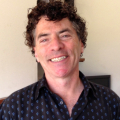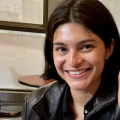Meta-awareness
To have an experience is not necessarily to know that one is having it. Situations such as suddenly realizing that one has not been listening to one’s spouse (despite nodding attentively) or catching oneself shouting “I’m not angry”, illustrate that we sometimes fail to notice what is going on in our own head. One of the overarching themes of the lab is the distinction between having an experience (experiential consciousness) and knowing that you are having an experience (meta-awareness) (Schooler, 2002; Chin & Schooler, 2009, Schooler et al, 2011; Winkielman and Schooler, 2009, 2011). This distinction has provided considerable intellectual leverage for thinking about a host of phenomena. For example, it explains why it is that people mind-wander while reading despite knowing that it is not possible to simultaneously carry on two independent trains of thought. Accordingly, people frequently lack meta-awareness of the fact that they are mind wandering while reading and therefore fail to stop (Schooler et al, 2011). It also explains why various manipulations such as alcohol (Sayette, Reichle, & Schooler, 2009) and craving (Sayette, Schooler, & Reichle, 2012) can simultaneously reduce people’s ability to self-catch mind wandering while increasing their tendency to be caught mind wandering during experience sampling. Other applications of meta-awareness include clarifying the process of introspection (Schooler & Schreiber, 2004) and conceptualizing failures to recognize emotional experiences (Schooler & Maus, 2010).
News
Selected Publications
- Mind-Wandering as a Natural Kind: A Family-Resemblances View.
- Intentionality and meta-awareness of mind wandering: Are they one and the same, or distinct dimensions?
- Mind-wandering and meta-awareness in hypnosis and meditation: Relating executive function across states of consciousness.
- Pushing the Limits: Cognitive, Affective, & Neural Plasticity Revealed by an Intensive Multifaceted Intervention
- Unaware yet reliant on attention: Experience sampling reveals that mind-wandering impedes implicit learning
- The value of distinguishing between unconscious, conscious, and meta-conscious processes.
- Unnoticed intrusions: Dissociations of meta-consciousness in thought suppression
- Consciousness, Metacognition and the Unconscious
- Splitting consciousness: Unconscious, conscious, and metaconscious processes in social cognition
- Meta-awareness, perceptual decoupling and the wandering mind
- Meta-Awareness
- To be happy and to know it: The experience and meta- awareness of pleasure
- Meta-Cognition
- Unconscious, conscious, and metaconscious in social cognition
- The restless mind
- Motivating meta-awareness of mind wandering: A way to catch the mind in flight?
- Minding the mind: the value of distinguishing among unconscious, conscious, and metaconscious processes
- Language facilitates introspection: verbal mind-wandering has privileged access to consciousness
- Regional White Matter Variation Associated with Domain-specific Metacognitive Accuracy
- Tracking Distraction: The Relationship Between Mind-Wandering, Meta-Awareness, and ADHD Symptomatology
- Mind-wandering with and without awareness: An fMRI study of spontaneous thought processes
- To Know or Not to Know: Consciousness, Meta-Consciousness, and Motivation
- Experience, Meta-Consciousness, and the Paradox of Introspection
- Zoning out while reading: Evidence for dissociations between experience and metaconsciousness.
- The pursuit and assessment of happiness can be self-defeating
- Discovering memories in the light of meta-awareness.
- The distracted mind on the wheel: Overall propensity to mind wandering is associated with road crash responsibility.
- Mindful meta-awareness: sustained and non-propositional







